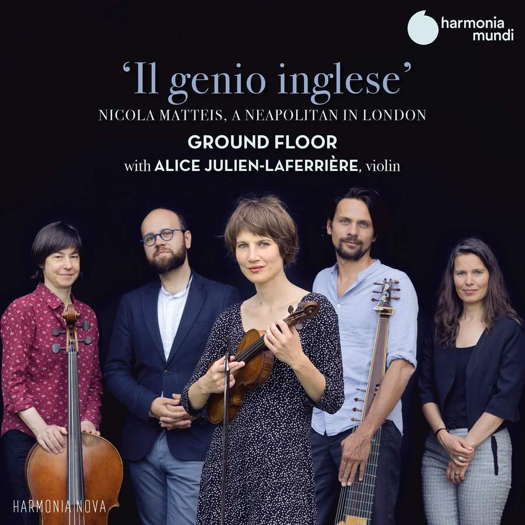 WORD SEARCH: Can you solve Allan Rae's classical music word search puzzles? We're currently publishing one per month.
WORD SEARCH: Can you solve Allan Rae's classical music word search puzzles? We're currently publishing one per month.
 DISCUSSION: What is a work? John Dante Prevedini leads a discussion about The performing artist as co-creator, including contributions from Halida Dinova, Yekaterina Lebedeva, Béla Hartmann, David Arditti and Stephen Francis Vasta.
DISCUSSION: What is a work? John Dante Prevedini leads a discussion about The performing artist as co-creator, including contributions from Halida Dinova, Yekaterina Lebedeva, Béla Hartmann, David Arditti and Stephen Francis Vasta.
- Petrograd
- Kyrgyzstan
- Sally Lundgren
- The Misty Morning
- Kupalinka
- Grindelwald
- Samuil Feinberg
- Madeira Music Festival

Merriment and Joy
Music by Nicola Matteis, John Banister, Gottfried Finger, Matthew Locke and Johann Schop, warmly recommended by GERALD FENECH
'Alice Julien-Laferrière and Ground Floor's interpretations are superb. Indeed, they have the skill to make light of the many technical difficulties, and play with a perfect blend of gravitas and dexterity which makes the music sing out with real joy.'
On 25 May 1660, Charles II landed in Dover after nine years of exile in the wake of a brutal civil war. This happy Restoration brought with it a torrent of merriment and joy, and on entering London four days later, on his birthday incidentally, the monarch rode at the head of a triumphal procession taking seven hours to pass through the city. With a royal court restored afresh in the palace of Whitehall, there came the urgent demand for music to celebrate all sorts of royal occasions. While in exile, Charles had enviously watched his cousin Louis XIV of France create a glittering court culture at the Louvre and Versailles, and not wanting to lag behind, Charles quickly set up a royal band of twenty-four violins and versatile performers to enrich every royal occasion with the best music of the day. And this is what this CD is all about.
Still, why is this issue entitled 'Il genio Inglese'? Who really was this 'English genius'? Indeed, he was none other than one of the most brilliant violinists of the period: Nicola Matteis. Born near Naples circa 1667, Matteis arrived in London around 1674, together with a host of other Italian artists and performers who flocked to England following the marriage that year of Princess Maria Beatrice of Modena d'Este to James, Duke of York, and King Charles' younger brother. This Italian artistic wave had a great impact on the King's court, and very soon Italianate virtuosity became the dominant form of entertainment. Matteis' works were at the fore of practically every soirée, and his rare gift for colouring and ornamenting a plain melodic line made him the most popular composer from among his compatriots.
Listen — Matteis: Ground in D 'per far la mano'
(track 2, 1:14-2:03) ℗ 2020 harmonia mundi musique sas :
This truly inspiring programme also includes pieces by four other composers, three of which: Johann Schop (c1590-1667), Matthew Locke (1621-1677) and John Banister (c1624-1679), preceded Mattheis.
Listen — John Banister: A division upon a ground in F
(track 35, 0:55-1:52) ℗ 2020 harmonia mundi musique sas :
Only Gottfried Finger (c1660-1730) was a contemporary.
Listen — Gottfried Finger: Overture (Suite in D minor)
(track 26, 0:01-0:59) ℗ 2020 harmonia mundi musique sas :
As expected, the majority of the works recorded here are by this 'English genius', but the rest certainly live up to the standard Mattheis set, even those written before he appeared on the scene. This mesmerizing violinist died in 1737 aged around seventy, leaving behind him a legacy of sheer brilliance which was to culminate in the works of another Nicolo: Paganini, a century later. These pieces have wit, gracefulness and a wonderful sense of inventiveness, enmeshed in a framework of virtuosic fireworks that make this a programme to relish.
Listen — Matteis: Jigg (Suite for guitar)
(track 12, 0:57-1:33) ℗ 2020 harmonia mundi musique sas :
Alice Julien-Laferrière and Ground Floor's interpretations are superb. Indeed, they have the skill to make light of the many technical difficulties, and play with a perfect blend of gravitas and dexterity which makes the music sing out with real joy. Add to all this some high-tech sound quality and detailed annotations, and you really have an all-round jewel of a disc. Warmly recommended.
Copyright © 3 December 2020
Gerald Fenech,
Gzira, Malta

CD INFORMATION: IL GENIO INGLESE
MORE CLASSICAL MUSIC ARTICLES ABOUT ITALY


